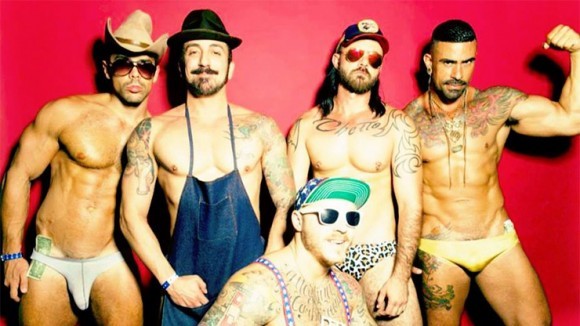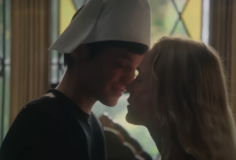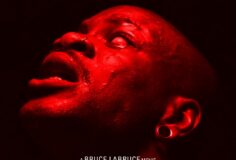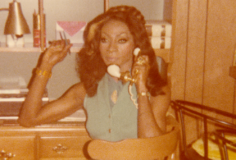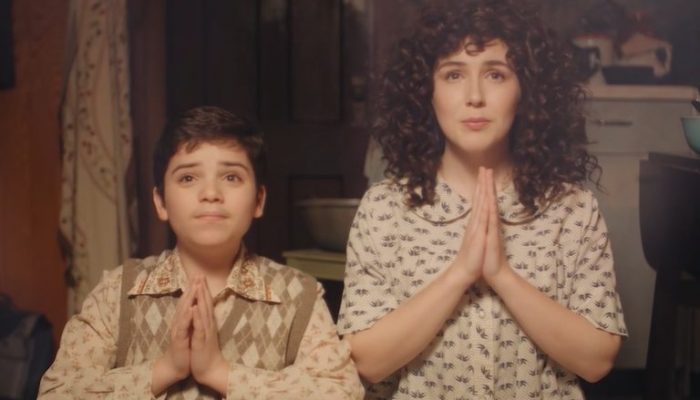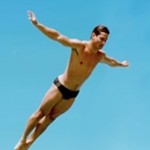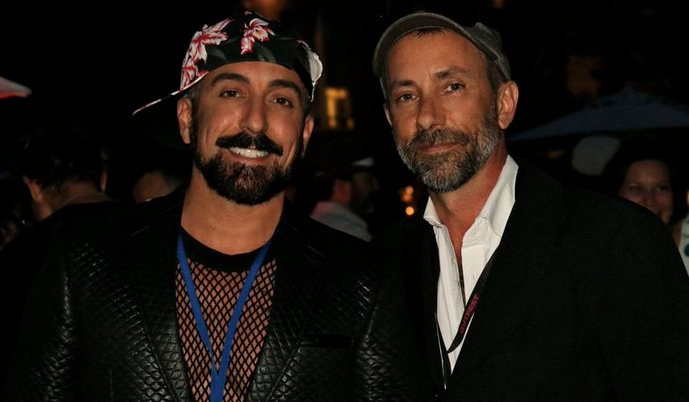
Subject and director of the documentary CLUB KING, Mario Diaz and Jon Bush are both scheduled to attend the SLGFF screening/after party on Saturday, Oct 11.
Photo: Outfest
We’ve been VERY excited about the documentary CLUB KING ever since we first got word about its existence last year. And, why not? It’s a fun profile of Seattle native MARIO DIAZ, who over the course of a 20+ career, has become one of the premiere queer nightlife producers in the country. Mr. Diaz cut his teeth in his hometown “back in the day” before heading to NYC and establishing his career. But, it’s his deliciously naughty events in Los Angeles that have earned him the title “Club King”. Mario’s fans line up outside the door to attend various weekly, monthy and seasonal parties like B.F.D., Full Frontal Disco, Big Fat Grunt and Brutus, which always feature Mario’s trademark line-up of the beefiest, hottest go go boys in town. (For more on Mario’s rise to Kinghood, check out his interview with our own L.A. Kendall done back in June of this year prior to his appearance at this year’s PrideFest celebration.)
And, since we JUST chatted with Mario, we decided to talk to the documentary’s director, JON BUSH to get the nitty and the gritty on the making of this film which screens this Saturday, October 11th at 9:15 pm at the newly re-opened Egyptian Theater as part of the Seattle Lesbian & Gay Film Festival. Mario and Jon (and other guests) are scheduled to be at the screening as well as at the hellaciously fun after party at Re-bar (media sponsored by SGS). To get tickets to film and party, go here, but first check out our chat with Mr. Bush.
Michael Strangeways: I sort of assumed you must have been a long time friend of Mario’s and you decided he’d make a great subject for a documentary, but that’s not the case apparently. How did Mario Diaz come to your attention?
Jon Bush: It’s true that I did not know Mario personally before I sat down with him over a Thai food lunch to pitch him this project in the summer of 2012. I first became aware of him when my dear friend, Justin Vivian Bond, moved from San Francisco (where I was living at the time) to New York sometime in the mid 1990’s. V would occasionally report back on the goings-on in the Big Apple, and it wasn’t long before we started hearing about some sexy, daring new club promoter who was tearing up the Queer underground with what sounded like a crazier version of what we were up to in SF (at the time, I believe we doubted that was possible).
MS: And, WHY make a movie about him? He’s been around for many years but he’s not old…it’s not like he’s out of the loop and ready for a retrospective. He’s still a viable and hugely popular party producer in LA. WHY did you want to make this your first feature film?
JB: Around 2010 or so, Mario and I became Facebook “friends,” which means at the time I became one of his thousands of followers. The pics and posts that flowed down my feed from him were incredible; hot shots of go-go boys, incredible portraits of his talented friends, borderline offensive but always hilarious memes, updates on his many fun projects and acting or artistic pursuits…I thought, “if his feed is this entertaining, how fun would it be to follow him around with a camera and capture some of this amazing life on tape?” Some of my favorite documentaries are cinema-verite, fly-on-the-wall examinations of current events or living entities that allow the viewer inside this incredible life, to see how it works. There are plenty of docs on living subjects – we don’t have to wait until someone’s dead to feature them. Some of my favorites are Hiro Dreams of Sushi, No Direction Home and Truth or Dare. Also, Mario’s contribution to NYC’s 90’s queer nightlife turned out to be very historic and significant – a special time to capture. So we did get to do a bit of the historical doc kind of thing with someone still living.
MS: Which leads to the question, how do you make a documentary about a living person, and one who’s still a viable and successful artist without it coming off as self-serving or overly pandering to the subject? Were there challenges to overcome in the editing to avoid it from coming across as a vanity project or as a commercial for Mario, even though it was YOUR original idea/project and not Mario’s. He apparently had to be convinced.
JB: Of course there were some concerns about this coming off purely as a vanity project or a big commercial for Mario, but most of that stemmed from my early creative decision NOT to feature naysayers, or competitors, or interviews with enemies. Thanks to reality TV, viewers expect gossip and shade. That wasn’t the style of story I wanted to tell. I’m sure I could have dredged the gutters of LA or New York and found plenty of haters who would shape the tale in a way that some would find a more balanced approach, but I wasn’t interested in rumors, gossip or, frankly, what any of his supposed haters were doing or what they thought. To me, Mario is an inspiration. I personally was and remain amazed at all the things he can do. Successful club promoter, producer, actor, dancer…he does everything with a level of professionalism and artistic acumen that blows most normal human beings off the map. I find that people take that 2 ways, generally: Either they’re amazed and inspired, or they’re jealous, envious and bitter. It’s a very human reaction. I chose to be inspired, and it honestly made me a better filmmaker, living up to his level of perfectionism. The other thing I did was create a very pronounced line between subject and filmmaker; Mario was allowed to suggest ideas, of course; it’s his life – there would be no way to figure out a story without plenty of interviews and meetings with him off-camera to figure out what or who to film. But he understood right away that for the documentary experience to be pure, he’d have to relinquish control and not interfere with the filmmaking process. This film is my baby and every final decision in the cut is mine. While at times that may have been difficult for someone who’s usually so in control of everything at all times as Mario, he early on learned to trust my creative instincts and let go.
MS: Does the fact that Mario is surrounded by a group of highly talented friends/collaborators (Jackie Beat, Selene Luna, Justin Vivian Bond, to name a few) and all those GORGEOUS male go go dancers make it easier, or in some ways, more difficult to make a film about his life? That’s a lot of talent and a lot of beefcake. Is it a challenge to balance all those charismatic personalities while remaining true to Mario’s story?
JB: The original idea for this project was a web series about Mario, where I had the idea that we could sort of break off from focusing so much on Mario into segues about his amazing friends, who are all so smart and talented they each deserve their own documentary (and, in the case of Jackie Beat, she has one). After a long-ish rough cut based on that original series idea kept falling flat at certain points in screenings with test audiences, I went back in and carved out a more traditional “arc” that focused more intently and solely on Mario, with his friends now contributing to that story, rather than telling (or showing) their own. It works better as a movie this way. And all those incredible personalities were eager to talk about Mario and what he does, so it didn’t take a lot of persuasion and cajoling to get them to fess up. I do have some incredible B-roll of performances and interviews with his friends that I hope will end up on the DVD extras, eventually. Real gold.
MS: Is a huge part of Mario’s success due to the fact, people LIKE Mario? In the nightlife world, a lot of party producers are tough cookies with tough reputations but Mario seems….beloved. Is he proof that a “nice guy” can be a success in a cutthroat world like nightlife production?
JB: Mario IS an incredibly sweet man – that really was a revelation working on this, since I didn’t know him going in. It could have been a nightmare, but I honestly lucked out. He has a huge heart and is very sensitive and smart, and watching him work at his clubs I could see a large part of what makes his parties so fun and successful is his incredibly positive attitude he brings. You can’t really throw a good party (in my opinion) if you’re a bitter human spreading hate and fear. That being said, he’s also a powerful personality, with a sharp artistic vision and a wicked-smart grasp of the business of nightlife. A perfectionist could be annoying to those who are a bit more lax in their execution, but with charm and determination you can sway those folks to see it your way. Mario and I share this kind of OCD perfectionist trait – it’s something we bonded over immediately. But we also share a fundamental optimism. I think his success is very much based on his personality, but also his gumption: He hasn’t stopped in over 20 years. And he’s very, very good at what he does.
MS: What’s next for this film? Where does it go from here? What do you hope it achieves?
JB: We’re winding down the 2014 LGBTQ film fest season (we’ve been in 15 fests so far) and are looking into submitting the doc into “straight” film festivals next. We’re finding that some of the most enthusiastic audiences are people who know nothing of gay club life or what it takes to be a promoter, so that open-minded heterosexual people of all ages and types are kind of glamorized by the exotic factor. Of course the Gays love it, too, but if you did the club scene in any metropolitan era in the 90’s some of it may feel familiar to you, a dirty waltz down slutty memory lane, if you will. We’re curious how it’ll play to a wider, mixed audience. We also still have not played in NYC, so, we’re thinking of producing a screening there and after party independently. There are so many friends and fans of Mario’s in NYC (and, a large part of our movie contains vital history of the mid-90’s East Village halcyon days) that we’re sure it’ll be a hit. Finally, we’re in talks to self-distribute via iTunes and other online platforms, perhaps as early as summer 2015.
MS: What’s next for YOU? This is your first directorial feature…do you have new films in development/production? Do you have a “dream” project?
JB: I’m a fictional narrative filmmaker first and foremost, so next up will be something I write and direct myself . I’m currently re-writing or developing 3 different projects, all very low budget, all wildly different subject matter, and would love to make any one of them next. I suppose I should do what most normal people do and focus on one, but they’re all really fun ideas and I guess I’ll just throw them out there and see what sticks. People have been asking me to make another documentary – I was just approached by people involved in the LA underground vogue scene to film something – but while I love docs, I’m really looking forward to directing a narrative next. It’s such a stupid, insane, expensive and complicated “artform” that – even after decades of doing this – I sometimes wonder if it’s worth all the intense work and added stress (I work full-time at a very intense job as well), but in the end I always realize: Yes. Yes, it is.
*******************************************************
Thanks to director Jon Bush for answering all our probing questions!
We hope this interview gets you excited about checking out this terrifically entertaining film about a fascinating subject. You’re strongly encouraged to grab tickets to the Seattle Lesbian & Gay Film Festival screening of Club King happening at 9:15pm on Saturday, October 11, 2014 at SIFF Cinema Egyptian on Capitol Hill. Jon Bush and Mario Diaz are scheduled to attend the screening (expect a Q&A after the film) and the after party at Re-bar produced by Qulture Qreative and Kendall’s DJ & Events. DJs Kendall, Skiddle, Julie Herrera and Stormy Roxxx will be on the board and a buttload of local glitterHotties will be on hand. (Plus, I think Mario might be bringing some LA hotties with him….).
You can just see the film or buy tickets for film and the party over HERE. Proceeds benefit Three Dollar Bill Cinema and Seattle PrideFest and Seattle Gay Scene is the official media sponsor for the event. (More info on the party HERE!)
SEE Y’ALL ON SATURDAY!!!


